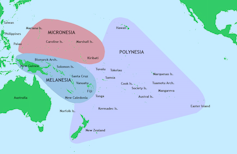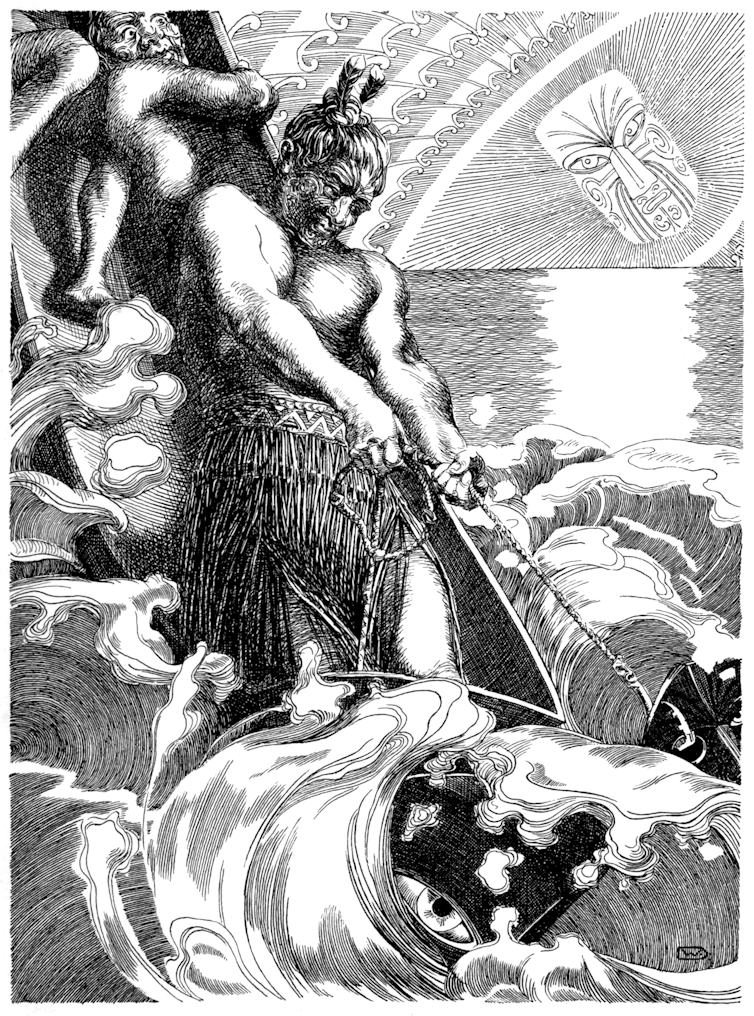I enjoyed Disney's 2016 film Moana. My relatives and I attended the Reo Māori release here in Aotearoa, in a packed theatre of Māori language supporters. Watching the film in our own language was emotional and powerful.
Author
- Mike Ross
Head of School, Te Kawa a Māui, School of Māori Studies, Te Herenga Waka — Victoria University of Wellington
Moana is a seagoing adventure portraying the courage of its Pacific characters. I see many aspects of Māori communities represented in the film: our elders, our voyaging history, our language and culture, our ability to adapt, our sense of spirituality and our hope.
I see the characters in my own whānau (extended family). My nephew is similar to the character of Māui, the demigod voiced by Dwayne Johnson. He's a likeable "big-boned" fulla with a quick wit - an overly confident rascal who draws others to him with a playfulness that gets him into (and out of) trouble.
At the same time, movies like Moana - in which non-Indigenous creators try to tell Indigenous stories - raise sensitive questions about authenticity, cultural appropriation and veiled forms of continuing colonisation.
Disney's bottom line is to develop characters and storylines that suit a global market and will ultimately be financially viable. Perhaps this is why it missed so many key characteristics of Māui as he is known to the Polynesian people.
In Moana, there is a mystique around Māui's demigod status; he sits in the space between the gods and humanity. Like the Māui of Polynesia, he can shapeshift, wields a magic hook and is courageous.
Yet this Hollywood Māui would have no chance against the Māui of Polynesia , who is not a god to be worshipped, but a spirit - a set of characteristics identified through the actions of a person. Māui's spirit lives today and can be activated by his descendants to do extraordinary things.

A Māori view of Māui
Māui's biggest muscles were in his head and stomach (where Māori believe the core being of a person is located). However, there is no record of him having an appearance that made him stand out in the community.
When Māui decided to rejoin his birth family as a young man, he lined up with his brothers, and his mother was unable to see a difference between the siblings' physical builds. This is in contrast with his unusually large build in Moana.
He also wasn't the playful, reckless larrikin depicted in Moana. He saw the world through clear eyes and calculated his way forward, courageously approaching challenges as opportunities to demonstrate his mastery.
He was innovative, intelligent, confident and resourceful - and most of what he did would benefit the whole community. That said, he could also be devious, cruel and jealous as he pushed to achieve his goals.
One of his names is "Māui-pōtiki", or "Māui the youngest sibling", which signals the characteristics of someone who challenged the status quo - a free thinker and a clever trickster.
Supernatural power leads to supernatural deeds
Māui faced a series of challenges . Some were forced on him, such as surviving his infancy. At birth he was presumed dead (or near death) and was abandoned to the sea. His grandfather rescued and raised him, teaching him skills, knowledge and karakia - the spiritual means to bend the laws of the universe in his favour.

He faced many challenges in his world, and his responses conveyed important social and life lessons. For instance, the days were too short and people were unable to complete their work before nightfall. So Māui's answer was to slow the Sun's journey across the sky. He convinced his sceptical brothers to help him and they went to the pit where the Sun rose each day.
Armed with plaited ropes, infused with spiritual power to hold the Sun, as well as the sacred jawbone of his ancestor (which he also used as a hook), they stationed themselves around the pit and waited.
As the Sun rose into the morning sky, the brothers pulled their ropes to form a tight net, trapping the Sun. Māui quickly climbed onto the Sun and began to beat him (the Sun is personified and thought to be masculine in Māori belief) with his ancestor's jawbone.
Dazed and battered, the Sun asked Māui the reason for the attack, who then gave him an ultimatum: "Slow your movement across the sky (or I'll be back)!" The Sun, from fear and injury, slowed down, providing a useful length of daylight for the people.
While violence may not be a justifiable approach to change, there's still much to learn from this incident. When you need to get something done, you should have a plan, build a team, make use of the resources available to you, be courageous and go for it.
Stories spread across the seas
Māui is credited with many other exploits . He hauled islands up across the Pacific. He spoke with the gods and creatures of the Earth. He even brought fire to the world from the goddess Mahuika and came close to conquering death.
Each story contains layers of knowledge, explaining important aspects of the world and human behaviour. This information was so significant that these stories have been passed down through generations for hundreds of years - spread with our voyaging ancestors across the Pacific, the largest continent in the world.
As such, Māui pops up in stories all across Polynesia, reaching into Melanesia and Micronesia. While the tales about the character, attitude, aptitude and mana (the spiritual lifeforce) are similar, variations exist across Polynesia.
Moana aims to entertain and speak to us and our children. Perhaps the sequel will now reawaken Māui-based discussions on marae (Māori communal spaces) and other Pacific forums. Or perhaps the spirit of Māui will see this "harmless rascal" persona as a launch pad to galvanise his descendants into addressing the ills that face them today.
Kia ara ake anō te kawa a Māui - let the spirit of Māui arise. And enjoy the movie.
![]()
Mike Ross receives funding from Victoria University of Wellington, The Waitangi Tribunal,






